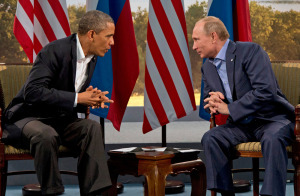 On Tuesday night’s call we paused for fifteen minutes to listen to President Obama’s speech advocating for military action to punish Syria for using chemical weapons.
On Tuesday night’s call we paused for fifteen minutes to listen to President Obama’s speech advocating for military action to punish Syria for using chemical weapons.
This story, unfolding in real time, provides a vivid tableau of evolutionary emergence in world politics. Two forces are arising, both representing moral progress, but each in contention with the other.
On one hand, we see a president who is trying to do something relatively new: to referee a war without necessarily influencing its outcome. Obama is saying, essentially: Okay Syria, you can fight it out, but there are two things you can’t do: 1) genocide and 2) weapons of mass destruction.
It’s odd to think about rules of war, but after enduring the horrors of the 20th Century, from mustard gas to atomic bombs to the holocaust, humanity has managed, through numerous cumulative treaties, to establish norms of warfare in the nascent domain of international law. This represents growth in human moral development, the fruit of which is that modern societies are the first in history to not use maximum weaponry in fighting their enemies.
The second and countervailing moral force is a reluctance on the part of the modern world to enforce these norms, at least militarily. Modern people begin to lose the juice for fighting that so animates the pre-modern psyche. By the time we get to post-modern consciousness we find physical confrontation to be repulsive. This is apparent in the response to Obama’s call to military action. Great Britain, the US’s most reliable ally, has refused to support it despite pleas from Prime Minister David Cameron and the foreign policy establishment. Polls of the American people have been consistently 2 to 1 against military engagement, and Obama’s request for authorization in Congress faced near certain demise.
So Obama is stuck between these two emergent forces, not only politically but also at his dinner table (he alluded that Michelle was against a strike), and one senses, in his own mind and heart.
Now we have Vladimir Putin step up and offer a way forward: Syria will turn over its chemical weapons to international control. And so began a diplomatic dance that … got us a deal in three days. Next on the agenda is a ceasefire. Sometimes the God of the Humans is kind.
Whatever happens short-term, I think it is much less likely today than it was a week ago that Assad will ever use chemical weapons again. The credibility of his key patron, Putin, has now been joined with Obama’s in seeing that it doesn’t happen. That’s a big deal and a big win for both the US and Russia — and the world.
Critics see the past few days as a tragedy of errors, but I see it as part of the unfolding of human progress: chaotic, inconsistent, hypocritical…and ever more humane. Listen to the call for more of my thoughts and for comments from listeners
Listen to an excerpt here:
Podcast: Download
Subscribe: Google Podcasts | RSS





